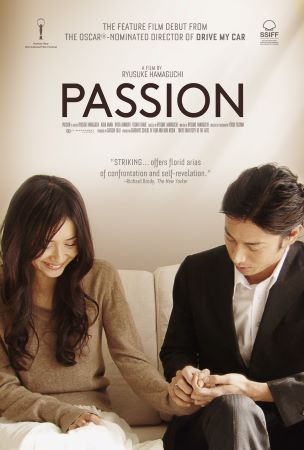
Passion 2008
Distributed by Film Movement
Produced by Satoshi Fujii
Directed by Ryûsuke Hamaguchi
Streaming, 115 mins
High School - General Adult
Film Production; Philosophy
Date Entered: 03/13/2024
Reviewed by Jennifer Dean, Film Editor, Filmmaker, Film CuratorFilmmaker Ryûsuke Hamaguchi rose to fame after winning the Oscar for best international feature film for Drive My Car based on a short story by Haruki Murakami. A wonderful exploration of art, loss and love - it is a thought provoking and layered film. Several years before Drive My Car, while a student at Tokyo University of the Arts, Hamaguchi directed Passion, his graduate thesis film which follows several young couples navigating love and life in modern day Japan. Reminiscent of a modern day Reality Bites (directed by Ben Stiller), exploring the angst of Generation Z twentysomethings in Japan in place of Generation X twentysomethings in the United States, Passion lacks the nuance of the filmmaker’s Oscar winning film.
In an interview subsequent to the recent North American release of Passion, Hamaguchi acknowledged the influence of John Cassavetes’ Faces on his film. As the young male friends leave the dinner party to explore the city in the opening scenes, I could not help but think of Cassavetes’ Husbands. Of course, filmmakers like John Cassavetes and Mike Nichols created extensive bodies of work using improvisational cinema techniques and allowing for experimentation and freedom for their actors. In this nascent work, however, Hamaguchi has yet to find his footing as a director and therefore the film often meanders with scenes that are too long and improvisational dialogue that does not quite work despite a beautifully evocative score and some wonderfully shot footage.
The most successful scene in the film depicts the female protagonist, teacher Kaho, engaging with her middle-school students in a discussion about violence. Through the course of the scene, she learns that a student who recently committed suicide was being bullied by the class. Aoba Kawai’s performance as Kaho engaging with the students is dynamic and subtle. The scene is skillfully directed and edited. The moment the bullying is revealed, the horror of the situation unfolds sensitively, without the heavy handedness of the emotions explored in much of the rest of the film. This scene would make a perfect standalone short film. It brought to mind Kathryn Bigelow’s Columbia University MFA thesis short film The Set-Up where two men fight on screen while two professors deconstruct the scene in voice-over, analyzing the fight through a philosophical lens.
As Hamaguchi continues to grow and work as a filmmaker Passion may become a useful tool in a class exploring his work, but as it stands the film shows little of the complexity of Drive My Car and covers ground that is better explored in other narrative films.
Awards:Official Selection, San Sevastian Film Festival; Official Selection Karlovy Vary International Film Festival; Nominated for Grand Prize, Tokyo FILMex
Published and licensed under the Creative Commons Attribution 4.0 license. Anyone can use these reviews, so long as they comply with the terms of the license.